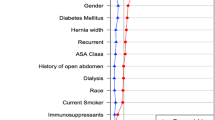Abstract
Purpose
Ventral hernia repair (VHR) postoperative complications vary in presentation, management, and severity. The aim of this study is to determine the impact of individual postoperative complications on long-term quality of life (QoL) after VHR.
Methods
Data from the Abdominal Core Health Quality Collaborative were analyzed retrospectively. Propensity score matching compared 1-year postoperative Hernia-Related Quality of Life Survey (HerQLes) summary scores between non-wound events (NWE), surgical site infection (SSI), and surgical site occurrence requiring procedural intervention (SSOPI) versus No-Complications.
Results
2796 patients who underwent VHR between 2013 and 2022 met the study criteria. Patients with SSI and SSOPI had lower QoL vs No-Complications (median (Interquartile range): 71 (40–92) vs 83 (52–94), P = 0.02; 68 (40–90) vs 78 (55–95), P = 0.008). NWE vs no-complications HerQLes score differences were similar (83 (53–92) vs 83 (60–93), P = 0.19).
Conclusion
Wound events seem to have larger impact on patients’ long-term QoL compared to NWE. Continued and aggressive efforts including preoperative optimization, technical points, and appropriate use of minimally invasive techniques can continue to reduce impactful wound events.

Similar content being viewed by others
Data Availability
This research study was conducted retrospectively from de-identified data from the Abdominal Core Health Quality Collaborative (ACHQC). The data is available upon request and approval through the ACHQC.
References
Schlosser KA, Renshaw SM, Tamer RM, Strassels SA, Poulose BK (2022) Ventral hernia repair: an increasing burden affecting abdominal core health. Hernia. https://doi.org/10.1007/s10029-022-02707-6.10.1007/s10029-022-02707-6
American College of Surgeons (2017) National surgical quality improvement project operations manual: ACS NSQIP variables and definitions. https://www.facs.org/media/p1enl5ym/nsqip_puf_userguide_2017.pdf. Accessed 25 July 2022
Americas Hernia Society Quality Collaborative (2019) Qualified clinical data registry. Physician quality reporting system measure specifications. https://www.achqc.org/uploads/general_images/AHSQC_2019_QCDR-All_Measures_2.11.19.pdf. Accessed 25 July 2022
Lee TJ, Ulisney KL, Choudhuri AK, Swiger JL, Gibeily GJ (2019) Understanding the patient perspective after ventral hernia repair. Hernia 23(5):995–1001. https://doi.org/10.1007/s10029-019-02015-6
Krpata DM, Schmotzer BJ, Flocke S, Jin J, Blatnik JA, Ermlich B, Novitsky YW, Rosen MJ (2012) Design and initial implementation of HerQLes: a hernia-related quality-of-life survey to assess abdominal wall function. J Am Coll Surg 215(5):635–642. https://doi.org/10.1016/j.jamcollsurg.2012.06.412
Poulose BK, Roll S, Murphy JW, Matthews BD, Todd Heniford B, Voeller G, Hope WW, Goldblatt MI, Adrales GL, Rosen MJ (2016) Design and implementation of the Americas Hernia Society Quality Collaborative (AHSQC): improving value in hernia care. Hernia 20(2):177–189. https://doi.org/10.1007/s10029-016-1477-7
Haisley KR, Vadlamudi C, Gupta A, Collins CE, Renshaw SM, Poulose BK (2021) Greatest quality of life improvement in patients with large ventral hernias: an individual assessment of items in the HerQLes survey. J Surg Res 268:337–346. https://doi.org/10.1016/j.jss.2021.06.075
Kaoutzanis C, Leichtle SW, Mouawad NJ, Welch KB, Lampman RM, Wahl WL, Cleary RK (2015) Risk factors for postoperative wound infections and prolonged hospitalization after ventral/incisional hernia repair. Hernia 19(1):113–123. https://doi.org/10.1007/s10029-013-1155-y
Huntington C, Gamble J, Blair L, Cox T, Prasad T, Lincourt A, Augenstein V, Heniford BT (2016) Quantification of the effect of diabetes mellitus on ventral hernia repair: results from two national registries. Am Surg 82(8):661–671
Lindmark M, Strigård K, Löwenmark T, Dahlstrand U, Gunnarsson U (2018) Risk factors for surgical complications in ventral hernia repair. World J Surg 42(11):3528–3536. https://doi.org/10.1007/s00268-018-4642-6
McGreevy JM, Goodney PP, Birkmeyer CM, Finlayson SR, Laycock WS, Birkmeyer JD (2003) A prospective study comparing the complication rates between laparoscopic and open ventral hernia repairs. Surg Endosc 17(11):1778–1780. https://doi.org/10.1007/s00464-002-8851-5
Wilson RB, Farooque Y (2022) Risks and prevention of surgical site infection after hernia mesh repair and the predictive utility of ACS-NSQIP. J Gastrointest Surg 26(4):950–964. https://doi.org/10.1007/s11605-022-05248-6
Acknowledgements
None.
Funding
This study did not receive any funding.
Author information
Authors and Affiliations
Contributions
All contributors to this study who meet authorship criteria are listed as authors. All authors certify that they have participated sufficiently in the work to take public responsibility for the content, including participation in the concept, design, analysis, writing, or editing of the final manuscript.
Corresponding author
Ethics declarations
Conflict of interest
Benjamin Poulose: Has received research support from Bard-Davol and Advanced Medical Solutions; he receives salary support from the ACHQC as the ACHQC Director for Quality and Outcomes. Ramez Alzatari, Justin Doble, Roukaya Hassanein, and Li-Ching Huang declare that they have no conflict of interest.
Ethical approval
The institutional review board of The Ohio State University determined that the study did not need ethical approval. An institutional review board official waiver of ethical approval was granted from the institutional review board of The Ohio State University.
Informed consent
This analysis was determined from obtaining informed consent by the IRB at The Ohio State University.
Human and animal rights
This analysis did not directly involve humans. The data was obtained from a national hernia database.
Additional information
Publisher's Note
Springer Nature remains neutral with regard to jurisdictional claims in published maps and institutional affiliations.
Rights and permissions
Springer Nature or its licensor (e.g. a society or other partner) holds exclusive rights to this article under a publishing agreement with the author(s) or other rightsholder(s); author self-archiving of the accepted manuscript version of this article is solely governed by the terms of such publishing agreement and applicable law.
About this article
Cite this article
Alzatari, R., Hassanein, R., Doble, J. et al. Determining the impact of individual ventral hernia repair complications on patient-reported quality of life. Hernia 27, 687–694 (2023). https://doi.org/10.1007/s10029-023-02800-4
Received:
Accepted:
Published:
Issue Date:
DOI: https://doi.org/10.1007/s10029-023-02800-4




